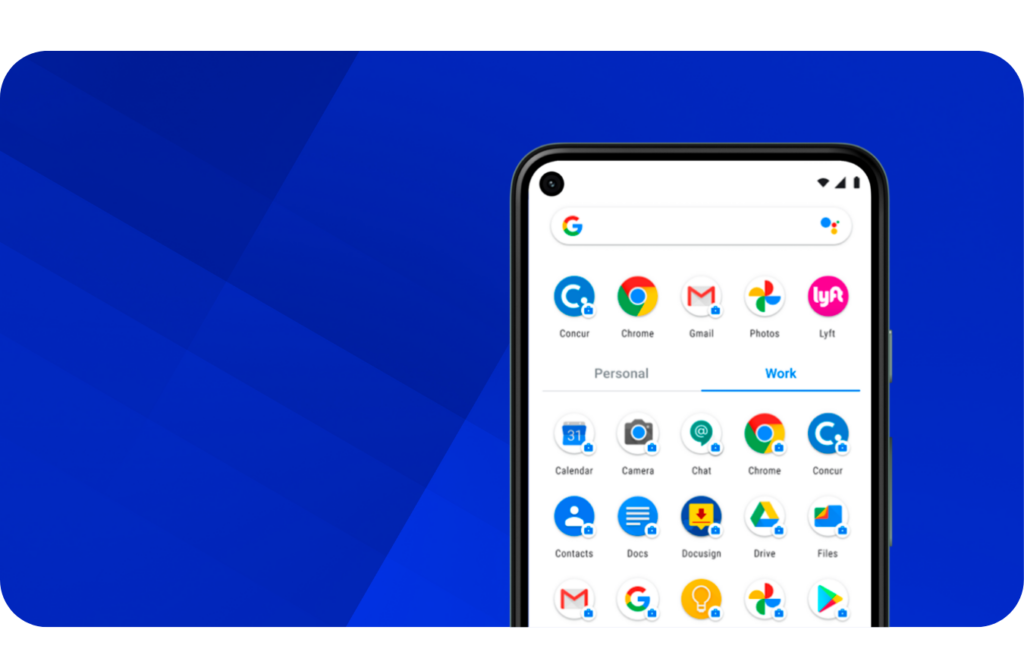Mobile Device Management (MDM) is a type of software solution that enables businesses to manage and control mobile devices such as smartphones, tablets, and laptops that are used to access company data and applications. MDM allows companies to remotely manage and configure mobile devices, enforce security policies, monitor device usage, enforce password policies, remotely wipe data, and control which applications can be installed on the device. MDM can also be used to monitor employee activity on mobile devices, such as which apps are being used and for how long.
However, all of this raises the question: how much information should organizations be able to see about their employees? And at what point does monitoring employee activity cross the line into invasion of privacy?
What IT Managers Can and Cannot See About the Employee Device
Usually IT managers cannot see what is on the devices, who is using them, how the devices are being used, or what apps are installed on them. This lack of visibility can be a problem for the company, as it may not be able to tell if devices are being used for unauthorized purposes, or if they are not being used at all. It can also make it difficult to troubleshoot problems with devices, as the managers may not be able to see what is happening on the devices.
Without an MDM solution, the data IT managers can manage and access is very limited :
- IT managers can only see which devices are enrolled in the system, the make and model, the operating system, and the software and hardware status.
- Limited ability to enforce policies and security standards
- Cannot remotely access enrolled devices
- Limited ability to monitor and manage devices
Here is where MDM is key, as it offers IT managers detailed information about employee mobile devices, including:
- Enrolled and non-enrolled devices control
- Devices inventory with make, model, operating system, and software and hardware status
- Device location, installed apps, battery life, network connectivity, device usage (calls, texts, emails, browsing history), and company application and data use
- Policy enforcement and security standard implementation
- Remote access to enrolled devices and remote command issuing
- Enhanced device monitoring and management, including visibility into personal calls, texts, emails, and non-work-related apps, ensuring secure and controlled use for work-related purposes.
However, there are limits to what companies can see about their employees. MDM cannot be used to monitor personal calls, texts, or emails or to access personal apps that are not related to work, including personal social media accounts, banking applications, etc.
Privacy Implications of MDM
The use of MDM raises privacy concerns for employees. While companies have a legitimate interest in ensuring the security of their data, employees may feel uncomfortable with the level of monitoring that MDM provides as it may seem as an invasion of personal privacy, especially if employees are using their personal device for work purposes.
To address these concerns, companies must be transparent about their use of MDM and ensure that employees are aware of what information is being collected and how it is being used. Companies should also implement clear policies around the use of personal devices for work purposes and ensure that employees are aware of their rights when it comes to privacy.
The Work Profile
The Work Profile is a containerized environment within a mobile device that segregates personal and work-related data, applications, and settings. It allows companies to enforce security policies and manage corporate applications and data without intruding into employees’ personal space. By isolating work-related activities, the Work Profile safeguards sensitive information from potential security threats and reduces the risk of data breaches or unauthorized access.
For companies, the benefits of utilizing a Work Profile are manifold. Firstly, it enhances data security by separating personal and corporate data. This segregation prevents potential data leakage from personal apps or accidental sharing of sensitive information. Additionally, the Work Profile enables remote management and enforcement of security policies, ensuring that all corporate devices meet specific compliance requirements. It also simplifies the process of application distribution and updates, allowing companies to efficiently deploy and manage business-critical apps.
However, the Work Profile does come with some disadvantages, particularly from the employees’ perspective. One of the main concerns is the potential invasion of personal privacy. Although the Work Profile is designed to keep personal and work data separate, employees may still feel uneasy about the possibility of their employers monitoring or accessing their personal apps or information. Striking a balance between ensuring security and respecting employees’ privacy is crucial to maintain a healthy work environment.

Conclusion
MDM is a valuable tool for companies that need to manage and control mobile devices that are used to access company data and applications. However, it is important to recognize the privacy implications of MDM and to ensure that employees’ personal privacy is respected. Companies must be transparent about their use of MDM and implement clear policies to address privacy concerns. By doing so, companies can ensure that they are using MDM in a way that is both effective and respectful of employees’ privacy rights.
At the end of the day, it is up to the employee to ensure their privacy settings are set in a way that they are comfortable with. If an employee is exceptionally concerned about their privacy, they may want to consult with their company’s IT department to see if there are any additional privacy measures that can be put in place.
In conclusion, it is important to know what your employees are up to on their devices, but it is also important to respect their privacy. When it comes to MDM, you can see a lot about an employee, but you should only use this information to help them become more productive, not to invade their privacy.
